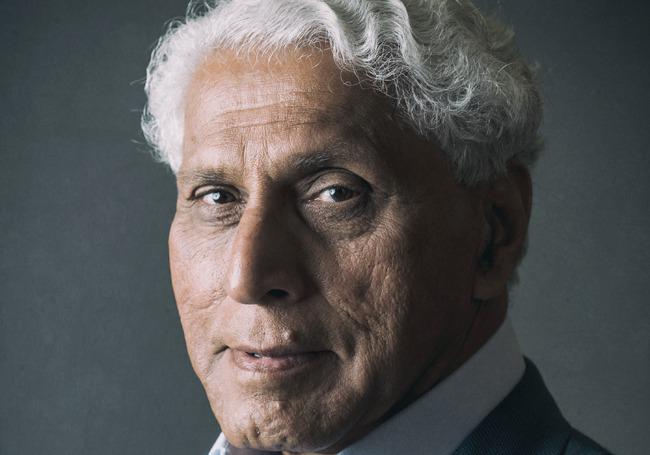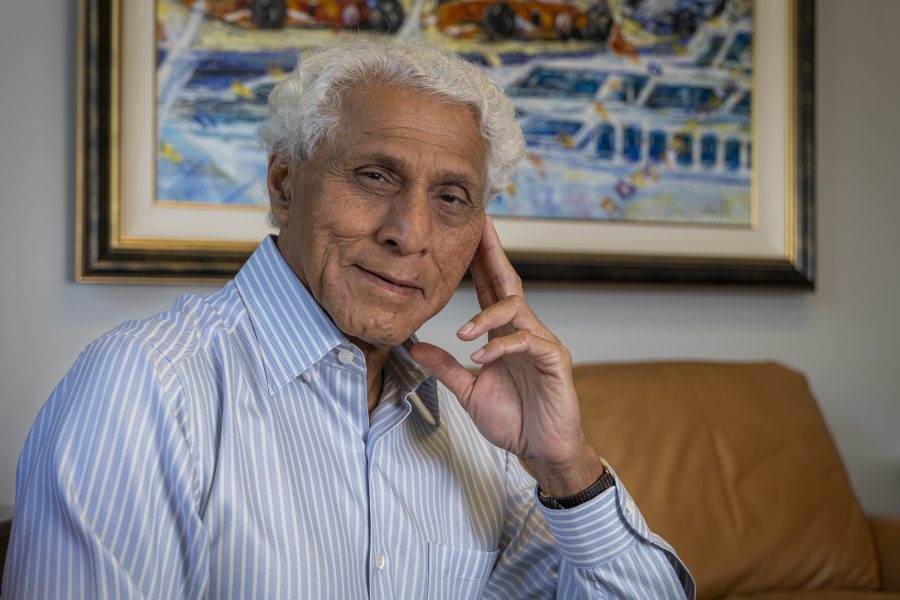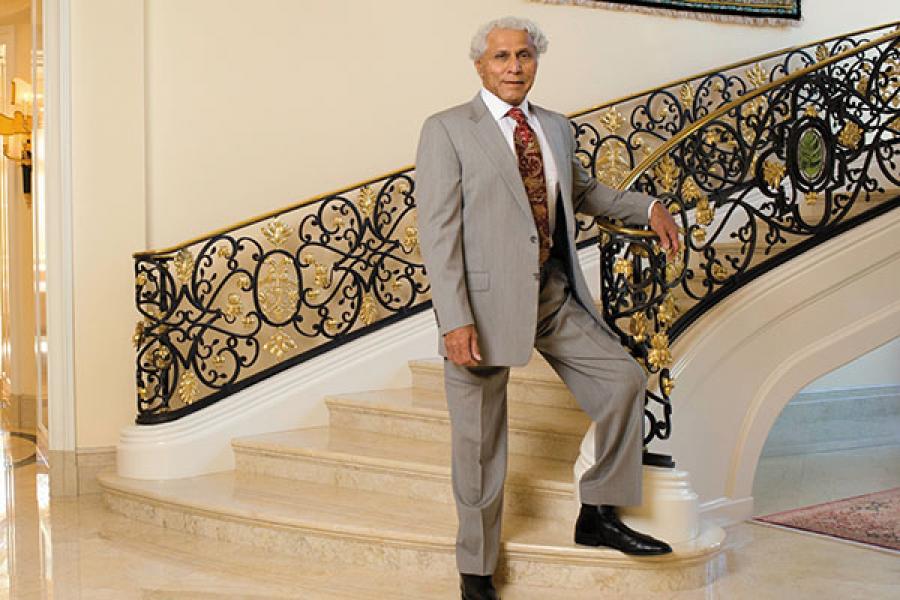
Romesh Wadhwani is the pioneer of India’s first ever Institute of Artificial Intelligence and has also launched several skill development centers to help people get the jobs.
“When you create a job, you help a person for life, you help their family and its succeeding generation for life. Other philanthropic activities are important but they don’t necessarily translate into lifelong value,” says Wadhwani.
Romesh T. Wadhwani is an entrepreneur, technologist, and philanthropist. Over his business career, he has built more than 40 successful technology companies. During the last two decades, he has built the Wadhwani Foundation into the leading foundation focused on accelerating job creation in India and other emerging countries in Asia, Latin America, and Africa through large-scale initiatives in entrepreneurship, small business growth, and skilling.
Romesh Wadhwani, known as Indian-origin American billionaire, founder of technology group of companies and pioneer of Institute of Artificial Intelligence in India, is a Sindhi, and was born in Karachi Sindh. He was only a few days old when his parents had to leave their ancestral abode and settle in India during partition in 1947.
He was two-years-old when he contracted Polio, and has trouble walking even today. Still he got himself accepted to the prestigious Indian Institute of Technology in Mumbai. After graduation, he left for Carnegie Mellon in Pittsburgh in 1969 to get a master’s in electrical engineering, and then his Ph.D.
Wadhwani was never really interested to do a 9 to 5 job especially because he hated the thought of working for someone. So, after he graduated in 1972 he decided to stay back in America and start his own company. A lot of trouble came his way however he overcame a lot of obstacles and finally convinced a venture capitalist.
In an interview, Romesh Wadhwani shared how he started: “I came to the US in 1969, and late August 1969 I came to Pittsburgh, Pennsylvania to go to Carnegie Mellon University to get my Master’s degree in electrical engineering. I was invited to do a Ph.D. While doing the Master’s and Ph.D. I began to get this urge to start my own company instead of going to work for someone else. So that led me to start my first company in Pittsburgh immediately after graduating in 1972.”
“It was incredibly, incredibly, incredibly hard for a variety of reasons. The first is that I had no previous business experience whatsoever, no business experience in my family, no business experience personally, no working experience with any American company in any position – Just a guy with a good idea, so that was one major strike. The second major strike was I was not yet an American citizen and I had applied for a Green Card but was not yet an American citizen, so that was really a concern on the part of any venture capitalist who might be interested. And the third big issue was that Pittsburgh, Pennsylvania was not known for technology and had virtually no venture capital firms. So I had to come to the West Coast and go to New York and Boston to seek out venture capital. I had to call on over 100 venture capitalists before one of them agreed to provide $150,000 of venture capital.”
Romesh said, “The idea of becoming a technology entrepreneur in India in 1969 without any capital, without any business credibility, I would say, it would have been virtually impossible. Whereas in the US, even though it was extremely difficult, I had to call on over a 100 venture capitalists, face a lot of rejection, have a lot of scars on my back, ultimately, someone did believe, someone was willing to invest, employees were willing to come work for me, customers were willing to buy from me. That willingness to support a startup entrepreneur, regardless of background, regardless of ethnicity, regardless of all these other facts, I think is unique to the American culture and to the American business environment. Long way of saying, I could not have done it in India. I was able to do it in the US.”
 For ten years, Wadhwani was the founder, chairman, and CEO of two companies, one (American Robot Corporation) specializing in software and solutions for computer-integrated manufacturing and the other (Compu-Guard Corporation) in technology-enabled energy management.
For ten years, Wadhwani was the founder, chairman, and CEO of two companies, one (American Robot Corporation) specializing in software and solutions for computer-integrated manufacturing and the other (Compu-Guard Corporation) in technology-enabled energy management.
Later he founded software firm Aspect Development, Inc. in 1991which he sold for $9.3 billion. Again, he founded Symphony Technology Group with interests in 18 technology and analytics companies and became a U.S. citizen worth $3 billion, and ranked No. 222 among The Forbes 400’s wealthiest Americans.
At a later stage he combined nine of his companies that were AI-focused into a new group called SymphonyAI in 2017.
Wadhwani is the executive chairman of Symphony Teleca Corporation, MSC Software Inc, Symphony Health Solutions Inc, and Shopzilla Inc, and is on the board of Information Resources Inc. Wadhwani is the largest limited partner in each of Symphony’s private equity funds.
“The ability to achieve without family background, ethnicity or social status being barriers in the way – To me, that’s my definition of the American dream” – Romesh T. Wadhwani shared summing up his story of struggle in America.
Philanthropy
Romesh, who lives in Palo Alto, California, established Wadhwani Foundation in 2013 which active in 20 countries across Asia, Africa, and Latin America. He established the Foundation for economic development in emerging economies, with an initial focus on India. Initiatives in India include the National Entrepreneurship Network, which has established programs to enable growth-centric entrepreneurship at over 500 universities and colleges; a skills college network to help train and place large numbers of young adults in vocational jobs; an ‘opportunities network’ for the disabled; and a research initiative in biosciences and biotechnology to help create jobs through innovation.
Nearly 3,000 faculty members have been trained—1,300 in the last one year alone—and a mentor resource network of 3,500 successful businesspersons and venture capitalists exists to provide free consultation in 30 cities.
Wadhwani had been holding discussions with Indian government about setting up community colleges for skills development, and laying down the framework for what these colleges would mean for India.
The Foundation has launched a US-India policy initiative, with Rick Inderfurth, previously Assistant Secretary of State, as the Wadhwani Chair at the Center for Strategic and International Studies, a policy think tank in Washington D.C. and Hemant Singh, former Indian Ambassador to Japan, as the head of the Wadhwani program at ICRIER, a major policy institute in Delhi.
In 2012, he inaugurated a new research center at the National Centre for Biological Sciences (NCBS) in Bangalore, named after his late mother, Shanta Wadhwani.
He sits on the boards of the Kennedy Center and the Center for Strategic and International Studies. Wadhwani is on the board of trustees of the John F. Kennedy Center for the Performing Arts and the Center for Strategic and International Studies, both in Washington, D.C.
He and his brother, Sunil, founded the Wadhwani Institute of Artificial Intelligence at the University of Mumbai in 2018, committing over $30 million to develop artificial intelligence for public good.

His brother Sunil is the Founder-Donor of WISH Foundation, which runs over 300 technology-enabled health clinics in some of the poorest areas in India. He was the Co-Founder and CEO of iGate Corporation, an IT services firm which grew to over 34,000 employees and was sold for $4.5 billion in 2015. He has served on the boards of several institutions including Carnegie-Mellon University, George Washington University and United Way Worldwide. Sunil is a Distinguished Alumnus of IIT Madras and has a Master’s degree from Carnegie-Mellon University.
Last year, Romesh donated $34 Million to help India manage COVID-19 Pandemic.
Personal life
Romesh is married to Kathleen “Kathy” Wadhwani, and they live in Palo Alto, California. They have one daughter, Melina, who married Patrick Carey in 2011. Carey works as head of sales operations at Symphony Talent.
Honours
Romesh Wadhwani was awarded an honorary doctorate by the IIT Bombay in August 2018. He is Padma Shri 2020 awardee while also won the India Abroad Award for Lifetime Achievement in 2013.
____________________
Source: Your Tech Story, Wadhwani Artificial Intelligence, Center for Strategic and International Studies, Forbes India, Wikipedia and other websites
